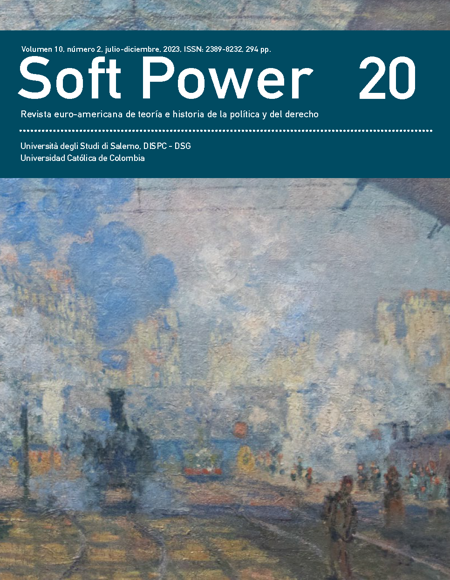
Esta obra está bajo una licencia internacional Creative Commons Atribución-NoComercial 4.0.
Al enviar los artículos para su evaluación, los autores aceptan que transfieren los derechos de publicación a Soft Power. Revista Soft Power para su publicación en cualquier medio. Con el fin de aumentar su visibilidad, los documentos se envían a bases de datos y sistemas de indización, así mismo pueden ser consultados en la página web de la Revista.Resumen
The figure of the “professional” looms large in contemporary neoliberal societies as an
ideal for economic activity and socio-political inclusion, and even as a model for individual
self-development, in spheres of existence extending far beyond the limited circle
of the specific types of (traditional and liberal) occupations. But how and when did this
figure arise? What has led professional activity to become such an essential part of our
personal, social, moral, economic, and political life?
In an attempt to address these –more than vaguely Weberian– questions, I propose to
look at professionalism as an experience, that is –to recast the definition of the latter notion
and overlapping given by Michel Foucault in his genealogical studies on sexuality– as the
correlation “of fields of knowledge, types of normativity and forms of subjectivity” (Foucault,
1984/1985, p. 4). The research presented in this book tries indeed –si parva licet componere
magnis– to remake Foucault’s philosophical move by shifting its focus and investigating the
conditions under which professional activity has become the object of a wide problematisation,
which involves different fields of knowledge (as law, philosophy, sociology and theology),
specific norms (legal and ethical), and a distinct way of conceiving one’s own identity, duties,
and abilities (the skilled professional, acting with professionalism). In so doing, the book
aims at contributing to a genealogy of professionalism, that is, to a historical investigation
of the stratified valorisation –at a moral, legal, social, economic, and epistemological level–
which has shaped the “professional” as a form of existence and an object of study.

Citas
Foucault, M. (1985). The History of Sexuality, vol. 2: The Use of Pleasure (R. Hurley,
Trans.). Penguin Books. (Original work published 1984).
Whatmore, R. (1998). The Weber Thesis: Unproven, Yet Unrefuted. In W. Lamont (Ed.),
Historical Controversies and Historians (pp. 95-108). University College London
Press.






